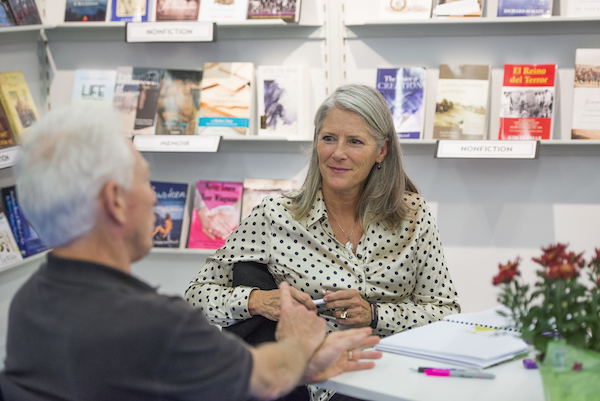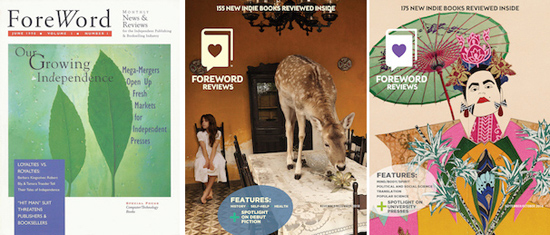PUBLISHED JANUARY/FEBRUARY 2019
interview by
Alexa Schlosser, Managing Editor,
IBPA Independent magazine --

Alexa Schlosser
Indie book reviewer Foreword Reviews has been around for 20 years. What has changed, and where are they going?
Foreword Reviews began in 1998 with a mission to help booksellers and librarians discover great books from independent presses. In the 1990s and early 2000s, corporate publishers were king, and the trade media focused its attention on titles from the big guys.
Foreword Reviews came along and injected quality reviews of indie books to the wholesalers and distributors where booksellers and librarians order their books.
Twenty years after its debut,
IBPA Independent sat down with founder and publisher of
Foreword Reviews, Victoria Sutherland, to see how she's seen the industry change in that time.
How has publishing, and specifically independent publishing, changed in the 20 years since Foreword began? What has stayed the same?

Victoria Sutherland
First of all, it's important to clarify the term independent publishing. Simply put, we consider everything between self-publishers and university presses putting out hundreds of titles a year to be a valuable part of independent publishing. In other words, indie is everything
except what's coming from the big five multimedia corporate publishers and their imprints.
When
Foreword Magazine debuted in 1998, indie publishing was tainted by an association with "vanity" publishing, and most presses tried to distance themselves from that moniker. Then, IBPA (PMA at the time) published a report called "The Rest of Us: The First Study of America's 53,000 Independent, Smaller Book Publishers," which recognized the swelling number of book sales coming from the indie press community. Now, self-published authors, hybrid publishing houses, and true independent presses are thriving. We have not seen a marginalization of the indie presses that were around 20 years ago; instead, they have matured into industry icons like Sourcebooks, Workman, WW Norton, and the like, which provide great examples of how to grow profitable publishing businesses.
What has changed is the opportunity for self-published authors to optimize their efforts with high quality marketing campaigns and professional editing, so now they can compete on a level playing field with the larger publishing houses. Most understand the importance of creating beautiful books, inside and out, in order to be taken seriously by trade buyers. This attention to quality is critical to rising above the noise level of over 1 million titles being published a year.
What's also changed is a greater awareness of the importance of diversity in all its forms, from the subjects covered in books to employing more people of color and increased gender diversity in the industry. This awareness is an important step to effecting positive change—something we can all contribute to.
What has stayed the same is the firecracker spirit indies provide to the industry. For instance, Gibb-Smith has had plenty of offers to "go big" in its 50 years of publishing but realized that editorial freedom and indie ethos was just something they weren't willing to give up. They have chosen to stay employee-owned, and are positioned for continued success.
And last but not least, indies are so very generous! With their time, idea sharing, and the exchange of expertise via social media (the new listserve!), as well as the personal interaction allowed at industry events.
 Victoria Sutherland is the founder and publisher of
Victoria Sutherland is the founder and publisher of Foreword Reviews.
How has the art of writing reviews changed over the years? And, related to that, how has Foreword Reviews changed?
VS: Unfortunately, change has happened in a direction that has not always benefited indie presses. Firstly, major daily newspapers that used to cover books in Sunday special sections have dropped or dramatically slimmed down book coverage. In addition, several of our peer review publications have reduced the length (word count) of their book reviews in an effort to cover more books—a move that results in reviews that are more of a title synopsis/annotation than a critique. Foreword has remained dedicated to old-fashioned, long-form reviews, but we have adapted the format of those reviews a bit to satisfy our licensees. The main change is that we now provide a summary paragraph at the beginning, in addition to "money quote" highlighted as a suggestion for cover copy. All review journals depend on advertising support to stay in business. By refusing to cover the big houses and concentrating on indie publishers,
Foreword is blessed with a large contingent of indie presses to draw upon for support.
It's hard to avoid the topic of fee for reviews with
Foreword. We introduced the original pay-for-review service, Clarion, in 2001, much to the chagrin of the entire industry. Launched in response to the great number of book submissions we received but could not afford to review in the print issue, Clarion provides the same lengthy, high-quality review as we do in the magazine. Of course, we would never give a mediocre book a good review simply because we were paid. Our credibility would have been shot instantly. But now, with reviews on demand, publishers have the opportunity to better strategize their publicity campaigns by requesting reviews early in order to get cover copy in a timely fashion. The biggest benefit, however, is the paid-for reviews are sent along to our licensees each month at Ingram, Baker & Taylor, and Bowker's BooksInPrint, which makes it effortless for the trade wholesalers to buy the books. Now, fee-for-review services are provided in some form by most trade journals and other new service providers, but we strongly believe our Clarion reviews set the industry standard.
 Foreword Reviews
Foreword Reviews covers over the years.
How would you describe the tastes of librarians and booksellers from now as compared to 1998?
VS: Voracious-for good books! After years of being concerned about e-books and larger retailers negatively affecting reading, we know the trade is still crazy for quality, objective information about books. What's changed is librarians and booksellers now have the ability to easily access indie press books. They know their readers value the indie press, and so they're comfortable filling their shelves with new discoveries, as long as they're confident that the books are of good quality. We just left the Michigan Library Association conference where it was a virtual
Foreword love-fest. The comments that really made us feel good were from librarians devoted to independent publishers. For them, it's a pleasure to turn their readers on to something they may not have been familiar with, all found in the pages of the magazine, and then easily located at their distributor.
What indie books/publishers are you most excited about?
VS: The easy answer is "all good indie books," and that's true. But here's a few shout-outs: Unnamed Press works with diverse and groundbreaking writers, and we love their work. Orenda Books releases atmospheric, often psychological mysteries. Algonquin has a real taste for beautiful literature. Publishers that cover works in translation, from Transit to Restless Books to Deep Vellum and Open Letter, are always of interest, too. We love books that push the envelope; any publisher engaged in that work has our eyes and ears.
Is there a particular genre you see as burgeoning right now?
VS: Perhaps burgeoning, or simply newly appealing, we're seeing a flood of new speculative fiction books, like Unholy Land from Tachyon and Famous Men Who Never Existed from Tin House, that explore alternate universes and parallel timelines, or that look for ways to penetrate this reality. Time travel is seeing a resurgence, too, and cli-fi is still heating up—hand-in-hand with post-apocalyptic novels, which are also growing out in other fascinating ways (see ECW's Moon of the Crusted Snow, which includes a criticism of colonialism in its end of the world scenario).
What excites you the most about the indie scene?
VS: Independent publishing celebrates the voices that traditional publishers tend to ignore. Diversity isn't treated as a necessity; instead, it's indie's lifeblood. It's part of the mission. We love that every submission period proffers surprising work from new and exciting voices, books that encourage expansion and learning and wonder. Independent publishers never stop challenging and delighting us as readers.
Alexa Schlosser is the managing editor of IBPA Independent
. Do you have a story that might be good for the magazine, or do you have an interest in contributing? Contact her at alexa@ibpa-online.org.
Learn more about this topic:
Reviews